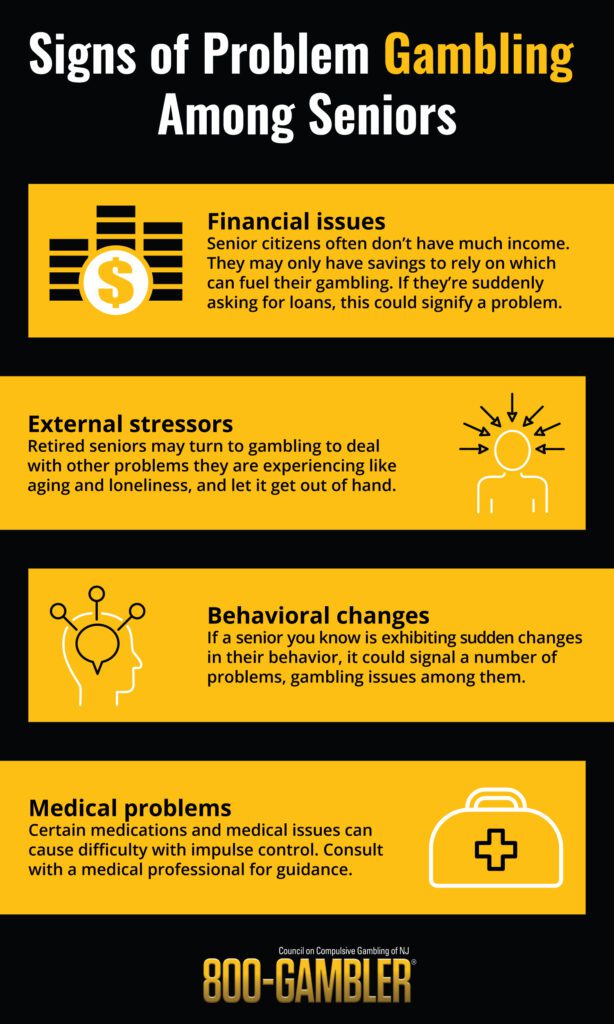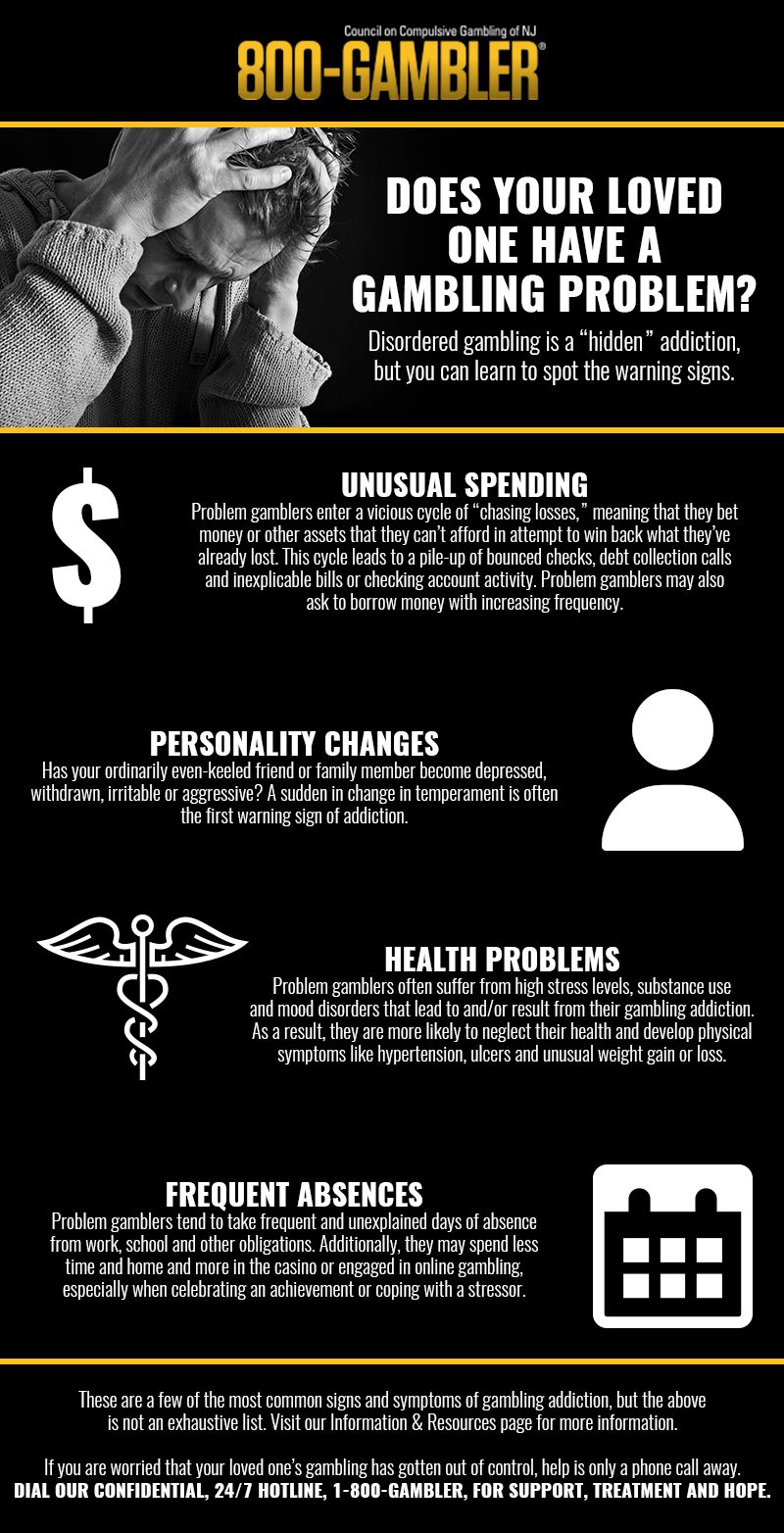Signs Of Someone With Gambling Problem
- Signs Of Someone With Gambling Problems
- Signs Of Someone With Gambling Problem Signs
- Warning Signs Of Gambling
- Signs Of Someone With Gambling Problem Solving
Diagnosing a gambling problem involves looking for signs someone is out of control. Possible signs of a gambling problem include: Spending more money on gambling than one can afford Difficulties in personal relationships caused by gambling. Because gambling addiction is often associated with depression, watch out for signs that you are, or your loved one is, suffering from this debilitating disorder. Lethargy, fatigue, change in appetite and unhappiness are several symptoms out of many that someone is suffering from depression.
Signs of Problem Gambling
Those individuals who are at risk to develop a problem with gambling or other substances or behaviors can potentially affect their families, friends, and loved ones. Like other addictions, the compulsion to gamble can seize the gambler’s life, causing devastating emotional and financial results. Often, the family is also emotionally injured and financially damaged by a gambling addiction. The tribal casinos that make up the Responsible Gaming Association of New Mexico voluntarily put their efforts into this combined campaign, for anyone who may develop an addiction to gambling.

What Is Problem Gambling?
“Problem gambling” implies that there are problems related to gambling, such as too much time spent gambling or too much money spent on the activity.
Signs Of Someone With Gambling Problems
Some problem gamblers get over their problem in time.
Some problem gamblers go on to develop the addiction – “compulsive gambling.”
Compulsive or “pathological” gambling means an addictive disorder with gambling exists and that the individual cannot stop gambling.
Untreated, compulsive gambling usually gets worse over time.
Someone who is a problem gambler may have other addictive behaviors such as drinking, drugs or smoking.
The Hidden Addiction
Most Americans are social gamblers who can enjoy the fun of gambling without harmful effects. As an association, we promote “knowing when to stop” so that gambling is considered an entertainment option.
Compulsive gambling is not just a “bad habit.” It is an emotional illness recognized by the American Psychiatric Association. Just as some people can become addicted to alcohol or drugs, compulsive gamblers become obsessed with an uncontrollable urge to gamble.
“Action” is what compulsive gambling is all about. Being in ACTION (gambling) is like taking a tranquilizer or stimulant to put the gambler in a desired mood. The effect, however, wears off when the gambler must face the reality of lost money and time.
As the disorder progressively increases, the compulsive gambler finds he/she must seek relief through even more gambling. The result is a progressive financial and emotional deterioration which can sometimes destroy both the gambler and his or her family.
Numerous prevalence surveys indicate that compulsive gambling affects one to three percent of those adults who gamble. Compulsive gambling can affect men and women of any age, race or religion, regardless of their financial or social status.
Keep gambling what it should be, entertainment. Know how to set your limits, and most importantly, know when to stop. If you feel you have a problem with gambling, or know someone who does, call (888) 696-2440 for free, confidential gambling addiction help.
Signs and Symptoms of Compulsive Gambling
Compulsive gambling is a term that indicates that the person’s gambling is compromising or damaging their personal, family, or vocational pursuits. Problem gambling has a broad severity spectrum and its cause appears to be related to several factors.
Below are some of the more common signs and symptoms of compulsive gambling:
- Gambling to calm nerves, forget worries, or reduce depression
- Losing interest in other things
- Talking about, thinking about, or planning to gamble and not doing other activities
- Lying about gambling habits
- Gambling alone or gambling more often
- Getting into arguments about gambling
- Going without basic needs in order to gamble
- Needing to gamble more and more money in order to get the desired effect
- Experiencing health problems related to gambling like lethargy, headaches, anxiety, and depression
- Having financial problems caused by gambling
- Do you ever lie about gambling?
- Have you ever borrowed money to finance your gambling?
If you answered yes to either question, learn about the signs of problem gambling and our free resources.
“The Responsible Gaming Association of New Mexico gave me serenity, peace, freedom, joy…gave me life basically. That’s what I have today. I can live free. I’m free.”
~ Geri Drennan
Remember to follow these tips in order to be safe when gambling:
- Gambling is paid entertainment that you are paying for, so treat the money you lose as the cost of your entertainment
- Don’t think of gambling as a way to make money
- Set a money limit
- Set a time limit & take regular breaks
- Only bring the cash you are willing to lose and leave ATM and credit cards at home
- Don’t leave credit cards or ATM cards in the car
- Expect to lose
- Don’t gamble when you are depressed or upset
- Balance gambling with other activities
- Gambling and alcohol are proven to not be a good combination
- Don’t chase losses
- Avoid becoming too superstitious
- Never fall for the gambler’s fallacy
- Learn the rules and odds of the games
- Educate yourself about problem gambling
- Don’t play with money you don’t have
- Don’t use your credit card to gamble
- Don’t increase your betting to make up for money you lost
- Don’t use gambling as a way to cope with stress, loneliness, or depression
- Never gamble with important money such as rent money
- If you are thinking about gambling all day long, get help
- If you are lying to others about your gambling, get help
- Never borrow money from others just to gamble
- Do not gamble to escape your problems or to ignore your responsibilities
- Gambling to pay off a gambling debt does not work
- It’s a sign of a problem if you are quitting your job or favorite hobbies to gamble
Treatment Providers: Join our E-mail List to Receive Updates


Counselors, join our mailing list to receive the latest news from our Problem Gambling Conferences
Thank you for subscribing to our newsletter! Coming soon to your email address!
Signs Of Someone With Gambling Problem Signs
Gambling addiction isn't diffcult to determine. Here are the symptoms and signs of addiction to gambling.
What are the Signs of Gambling Addiction?
The fourth edition of the Diagnostic and Statistical Manual of Mental Disorders lists the following criteria for pathological gambling: preoccupation, tolerance, withdrawal, escape, chasing, lying, loss of control, illegal acts, risk of significant relationship, and bailout.
Preoccupation
One sure sign of gambling addiction is preoccupation. Preoccupation occurs when the gambler constantly thinks about gambling. He or she may frequently recall past gambling experiences. The gambler's life is now centered on gambling and how to acquire money with which to gamble. A preoccupied gambler may duck out of certain obligations and spend money designated for other purposes just to fulfill the gratification gained by gambling.
Tolerance
Warning Signs Of Gambling
In the same way that a drug abuser can become tolerant of the substance that he or she is taking, one of the keys signs of a gambling addiction is the gambler becoming tolerant of gambling. The gambler becomes tolerant when he or she needs more and more money to achieve the desired sensation, just as a cocaine addict may need more and more cocaine.
Withdrawal: Another Sign of Gambling Addiction
Halting gambling may lead to withdrawal. This withdrawal may not come in a form as physical as the body's withdrawal from a substance, but a gambler suffering from withdrawal may experience agitation and irritability when he or she tries to gamble less or quit gambling altogether.
Escape
Pathological gamblers may also use gambling to escape from the world. They may be attempting to run away from their problems or to combat negative feelings of helplessness, guilt, anxiety, or depression.
Chasing
The gambling addict may also become a chaser of losses. In other words, when the gambler loses money, he or she returns the next day to try to gain it back or get even with the house.

Lying
You may have seen this sign of gambling addiction. Gambling addiction can lead to lying to both family members and friends about how the gambler is getting the money to gamble and the amount of time he or she is spending gambling.
Loss of Control
If you or a loved one has tried over and over again to stop gambling, this may be a sign that you have lost control to your gambling addiction and need to seek help. (more information about gambling addiction help)
Illegal Acts
Many compulsive gamblers become so in need of funds for their addiction that they resort to stealing—through larceny, fraud, or embezzlement—in order to continue their habits.
Risk of Significant Relationships
Another of the gambling addiction symptoms is how the gambler's relationships are affected, including jobs, personal relationships, educational opportunities, and so forth.
Final Gambling Addiction Sign: Bailout
A final symptom of gambling addiction is relying on others for monetary support for financial problems created by gambling.
Sources:
- DSM IV - American Psychiatric Association
- GamblingResearch.org
next: Do You Have A Gambling Problem?
~ all gambling addiction articles
~ all articles on addictions
Signs Of Someone With Gambling Problem Solving
APA Reference
Gluck, S. (2009, December 22). Signs of Gambling Addiction, HealthyPlace. Retrieved on 2020, December 31 from https://www.healthyplace.com/addictions/gambling-addiction/signs-gambling-addiction